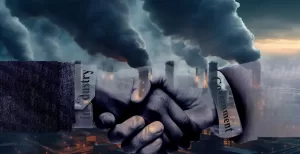Is the Modi government subsidising the rich at the cost of the poor by diverting foodgrains meant for the most impoverished sections of the population to private industries for producing alcohol for India’s ethanol blended petrol programme?
There’s more: For manufacturing ethanol, foodgrains will not only be sold to these industries at subsidised rates but units seeking to expand their capacities for the purpose will also no longer need mandatory Environment Clearances.
In addition, the Modi-led Union government has already identified hundreds of existing industrial units that will be provided financial assistance for enhancing their ethanol producing infrastructure. The entire exercise, as per the claims of the government, is to increase production of ethanol which will ultimately be blended with petrol for use as vehicular fuel in order to reduce India’s oil import bill.
On June 15, Union Food Secretary Sudhansu Pandey announced in a press conference that 78,000 tons of rice from the state-owned Food Corporation of India (FCI) has been allocated at subsidised rates to private industries for producing ethanol for the period December 2020 to November 2021.
“It is just another indication that the government of India is misusing foodgrains of the public distribution system for purposes other than what it was essentially meant for. Today, with the pandemic, there is a greater need for foodgrains for those not covered under National Food Security Act, as well as for those covered under it at a higher level,” Nikhil Dey of the Right to Food Campaign told NewsClick.
“Foodgrains with the central government should first be used to universalise the public distribution system so that all people of the country are fed. For any purpose other than that, like manufacturing ethanol, foodgrains need to be procured from the open market which will give a clear idea about the viability of the ethanol blended programme,” he added.
Now, sample this: A day after the Food Secretary’s announcement, that is, on June 16, the Union Ministry of Environment, Forests & Climate Change issued a notification exempting sugar manufacturing units and distilleries from mandatory Environmental Clearances if they expand their projects or use their existing facilities for production of ethanol.
On April 30, the Union Ministry of Consumer Affairs, Food and Public Distribution had approved a list of 418 industrial units of different categories, seeking enhancement of their ethanol distillation capacities through the use of foodgrains, for financial assistance by way of interest subvention. On the same day, that is, on April 30, the Food Ministry also fixed a policy that rice from the FCI will be made available to private players desirous of producing ethanol at a rate of Rs 2,000 per quintal.
On the other hand, the Union government also issued another policy the same day fixing a reserve price of Rs 2,200 per quintal for state governments and public sector corporations under the Open Market Sale Scheme (OMSS) for any quantity of rice that they need over and above that allocated for the public distribution system.
It is noteworthy that with effect from December 31, 2019, the Union government had already slashed the reserve price of rice under OMSS scheme from Rs 2,785 per quintal to Rs 2,250 per quintal. But now, who will pay for the subsidy at which rice will be provided to private ethanol producers? The answer is yet unclear.
By the year 2025, the government aims to more than double up ethanol manufacturing facilities in the country and achieve a blending target of 20%. The government has claimed that production of fuel-grade ethanol has increased by as many as five times in between the years 2013-14 and 2018-19.
In Ethanol Supply Year (December 2018-November 2019), about 189 crore litres of fuel-grade ethanol was produced in the country thereby achieving 5% blending. The government expects that more than 300 crore litres of ethanol is likely to be supplied to oil marketing companies in 2020-21 which will help achieve blending levels of around 8.5%. A blending percentage of 10% is likely to be achieved by the end of 2022.
Apart from rice, maize and sugar cane are also being made available by the Union government for the ethanol blended petrol programme. However, it was diversion of rice – a first for India – for producing ethanol which had invited sharp criticism from several quarters when a decision was taken last year by the National Biofuel Coordination Committee that is headed by Union Petroleum Minister Dharmendra Pradhan.
Though this decision was criticised, primarily on the grounds that it was taken at a time of projected food shortages when the world is facing the worst-ever pandemic in 100 years that has resulted in falling economic activities and contraction of economies, it is supported by a certain section of agricultural experts.
“We are already a food surplus economy. Projecting food shortages because a certain quantity of grains is diverted for alternate use is a leaf out of an old school of thought. We already have excess stocks of rice with the Food Corporation of India. If a certain quantity of it is disposed of for producing ethanol, it will help clear the old stocks. The greatest benefit that will accrue out of this exercise is that the country will save a lot of foreign exchange which is otherwise spent on account of oil imports,” said Dr Pramod Kumar Joshi, president of the Agricultural Economics Research Association.
The argument that India is a food surplus economy because of FCI godowns is proffered, notwithstanding the fact that per capita availabilities of food grains per day in the country have either remained stagnant or declined over recent years.
As per data of the New Delhi-based Indian Agricultural Statistics Research Institute, per capita availability of food grains had declined from 489.3 grams per day in the year 2014 to 484.3 grams in 2018. Similarly, the per capita availability of rice declined from 198 grams per day in 2014 to 189 grams in 2018.
At the same time, results of the National Family Health Survey indicate that there has been a stagnation in nutrition status, particularly of women and children, in India. A number of states have reported worsening of indicators pertaining to childhood stunting, wasting and underweight pointing towards chronic and acute malnutrition amongst children.
The government has claimed that with 100 crore litres of ethanol manufacturing capacity coming up in the country, rice as a raw material will be supplied only as an ad interim measure till maize production achieves a certain threshold that is enough to feed the plants. This does not explain though as to why rice has to be provided to the plants at subsidized rates. Apart from the cost of subsidy, it is also projected that the country will have to bear with the environmental costs of operating these plants.
In the notification issued on June 16, the Union government has also exempted plants producing ethanol from obtaining any certification from competent authorities before beginning operations. Self-certification will suffice the purpose! The Environment Impact Assessment (EIA) Notification, 2006 has simply been amended to categorise these industries under the B2 list of projects, which need no prior assessment to ascertain their projected impact on the local ecology.
“This amendment is yet another instance of the discretionary use of executive powers to introduce exemptions in the environment clearance process. It once again relies on self-certification by project proponents and assumptions that there would be honest disclosure. The Environment Ministry has made it a practice to treat environment clearances as two-party contracts, that is, between government and private companies, as if they are executed in empty geographies with no other impacted party,” said Kanchi Kohli of the New Delhi-based Centre for Policy Research.
(Courtesy: Newsclick.)




